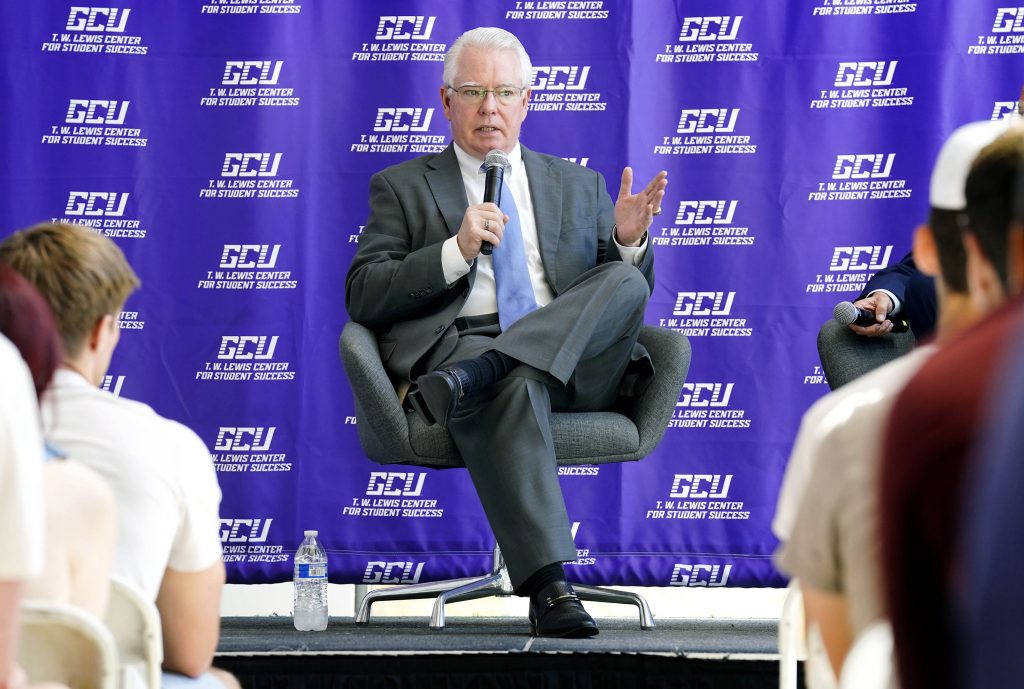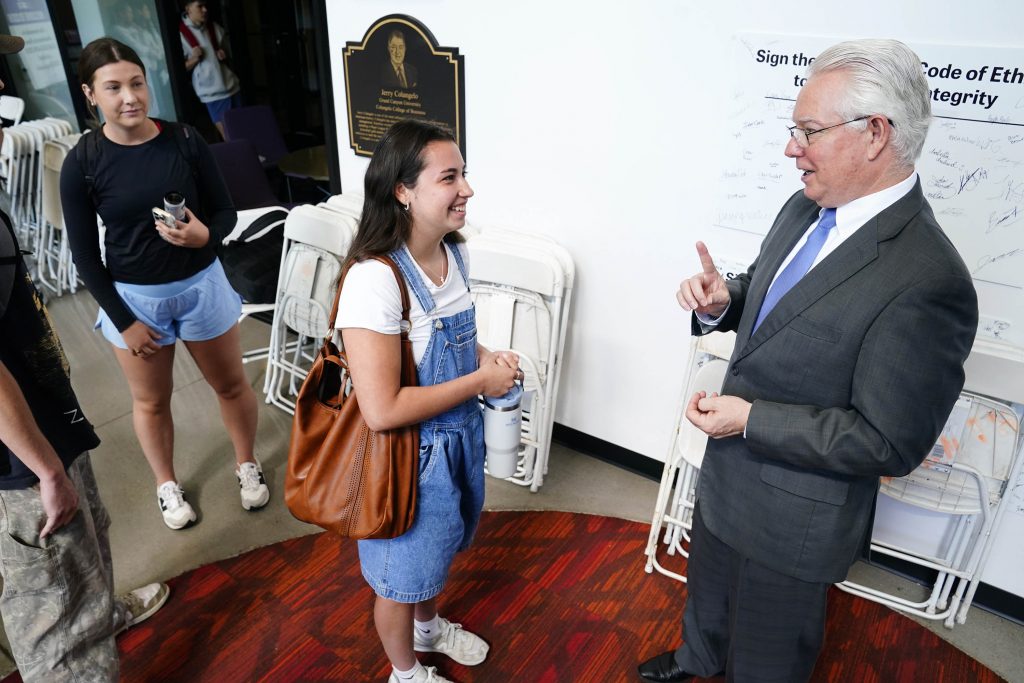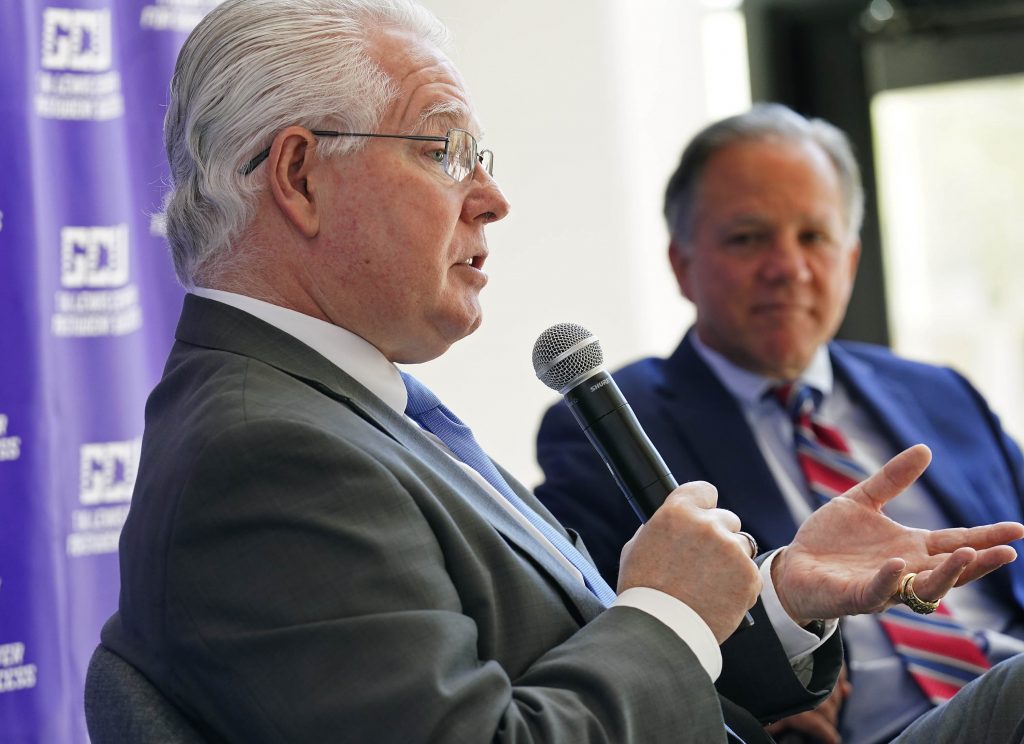
Photos by Ralph Freso
It's not about winning or losing a case, but that justice has been done in every case, said Arizona Supreme Court Justice William Montgomery in recalling his days as a Maricopa County prosecutor.
“There are stereotypes of just about every profession, and the stereotype of prosecutors is that they're trying to send everybody to prison,” said Montgomery, the featured speaker at Tuesday’s T.W. Lewis Speaker Series at Grand Canyon University's Colangelo College of Business lobby. “And sincerely, I used to love opportunities to give somebody a second chance.”
He recalled a case in which a woman with two prior felony convictions for shoplifting was in court on a charge of methamphetamines possession. The woman was facing a lengthy jail sentence after giving birth to a child. But a friend who ran a substance abuse program at the Salvation Army told Montgomery she had a bed for her – inpatient residential treatment was mandatory, Montgomery said.

A year later, he received photos and text messages that the patient reunited with her child, returned to school and earned a 4.0 grade point average.
“She's married,” he said. “She has a second child. She now interacts with others who have substance abuse and addiction issues to help them, and her work is all faith-based, too.”
Montgomery, a graduate of West Point military academy who served in operations Desert Shield and Desert Storm, shared his faith as a Catholic and believes his outspokenness about his faith cost him a shot at filling the first of two vacancies for the Arizona Supreme Court.
“I've always been mindful that, as Jesus told His disciples, that if you deny Me before man, I will not acknowledge you before My Father,” Montgomery said. “And it doesn't matter how many votes you win in an election. It doesn't matter how many terms you get to serve. Eternity is always longer than any term of office. So I figured at that point in time, you know what? I'd rather be known for who I am and get a job than who I wasn't.”
Another vacancy opened up months later, and this time he was on the nominee list and was appointed by then-Gov. Doug Ducey.
... I have to honestly be consistent with my oath, apply the law as it's written to the facts that I have in front of me, and not infuse in that decision my personal preference for what I would like the outcome to be."
Arizona Supreme Court Justice William Montgomery
“The short answer is, I never expected to be where I'm at today,” said Montgomery at the talk, moderated by John Kaites, dean of the business college and a former prosecutor. “I've always tried to be a good disciple, to go where the Lord leads me, and I've always believed that wherever I'm at, that's where He wants me to be.
“And when it's time for any change and do something else, He’ll let me know. Hopefully I'll listen the first time, and then we'll move on from there.”
Montgomery said, as a judge, he must apply the law and set his personal preferences aside.
“When I do my job as a justice on the Arizona Supreme Court and I'm reading the law, maybe I'm reading a case that involves family law and it involves a divorce,” Montgomery said. “It happened. I don't believe in divorce. I think it's awful. Are there circumstances where divorce might be appropriate? Necessary? Yes.
“… But that doesn't mean that when I write my opinion, I say, ‘Well, this is how I'm going to interpret the law to be consistent with the Catechism of the Catholic Church.’ They don't do that. What it means is that I have to honestly be consistent with my oath, apply the law as it's written to the facts that I have in front of me, and not infuse in that decision my personal preference for what I would like the outcome to be.”
One student considering a career as a defense attorney asked Montgomery about the moral and ethical struggles of cases.

“Do your job ethically,” Montgomery said. “Do your job in a way that one day you can look God in the eye and say, ‘I did the best job I could fulfilling the vocation you called me to.’ And if somewhere along the way you got a client who's found not guilty, then that's because the state wasn't able to prove (the client) guilty.
“And if you have people who wind up being found not guilty because they actually didn't do the crime, now you get a two-fer. Now you've got someone who will believe in the system because they were vindicated, and you did your job.”
Transitioning from law practice to the bench has provided a higher degree of normalcy for Montgomery, who is married with two children.
“I'm a Catholic Christian, that it's my job, first, to be a good husband and a good father, and then (what comes after that is) how I provided (for my family) in the vocation that I pursued.”

Montgomery addressed a student's question about how artificial intelligence might affect the number of legal jobs.
“I think it might even be better if we just refer to (AI) as assistive intelligence because it is a tool,” Montgomery said. “AI only knows what some human put into a large language model, for instance. So there's human input, and I don't believe that AI can innovate. AI can only work with what it's been given. It doesn't have a mind that can reason, and this is what distinguishes us from animals. We have a wealth of mind. It's a gift from God. We share in God's being with the ability to reason.”
Montgomery said federal district courts have issued orders requiring attorneys to certify that no AI was used in the preparation of their briefs, or if it was used, that the attorney certified they proofread those briefs.
“So there's always going to be a need for entry-level lawyers to do grunt work and to do document review and check. Chat GPT may be able to do some of it, but there's going to have to be a human being that checks it as well.”
Next T.W. Lewis Speaker Series talk: John Mullen and Dean Wilson of the Turner Foundation, 9 a.m. April 7, Colangelo College of Business lobby.
GCU News senior writer Mark Gonzales can be reached at [email protected]
***
Related content:
GCU News: Sports opportunities are plentiful, Brewers executive tells GCU students
GCU News: State treasurer emphasizes financial literacy to GCU students



































































